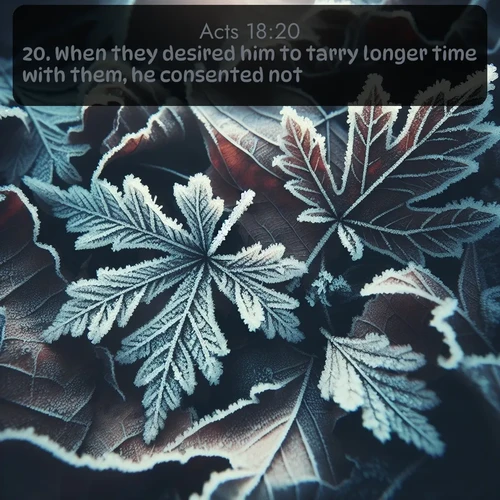Acts 18:20 plusieurs versions / traductions
English Bible Translations
20. And being requested by them to be there for a longer time, he said, No;
20. And when they asked him that he would remain for a longer time [with them] he did not accede,
20. and they having requested [him] to remain a longer time with them, he did not consent,
German Bible Translations
20. Sie baten ihn aber, daß er längere Zeit bei ihnen bliebe. Und er willigte nicht ein,
20. Als sie ihn aber baten, längere Zeit bei ihnen zu bleiben, willigte er nicht ein;
French Bible Translations
20. Mais lorsqu'ils le prièrent de demeurer plus longtemps avec eux, il n'y consentit pas,
20. Qui le prièrent de demeurer encore plus longtemps avec eux; mais il ne voulut point le leur accorder.
20. Qui le prièrent de demeurer plus longtemps avec eux; mais il n'y consentit pas.
Versions with Strong Codes
Acts 18 / KJV_Strong20. When[G1161] they[G846] desired[G2065] him to tarry[G3306] longer[G4119] time[G5550] with[G3844] them,[G846] he consented[G1962] not;[G3756]
Strong Code definitions
G1161 de/deh a primary particle (adversative or continuative); but, and, etc.:--also, and, but, moreover, now (often unexpressed in English).
G846 autos/ow-tos' from the particle au (perhaps akin to the base of G109 through the idea of a baffling wind) (backward); the reflexive pronoun self, used (alone or in the comparative 1438) of the third person , and (with the proper personal pronoun) of the other persons:--her, it(-self), one, the other, (mine) own, said, (self-), the) same, ((him-, my-, thy- )self, (your-)selves, she, that, their(-s), them(-selves), there(-at, - by, -in, -into, of, -on, -with), they, (these) things, this (man), those, together, very, which. Compare 848. see G109 see G1438 see G848
G2065 erotao/er-o-tah'-o apparently from G2046 (compare 2045); to interrogate; by implication, to request:--ask, beseech, desire, intreat, pray. Compare 4441. see G2046 see G2045 see G4441
G3306 meno/men'-o a primary verb; to stay (in a given place, state, relation or expectancy):--abide, continue, dwell, endure, be present, remain, stand, tarry (for), X thine own.
G4119 pleion/pli-own, or neuter pleon pleh'on comparative of G4183; more in quantity, number, or quality; also (in plural) the major portion:--X above, + exceed, more excellent, further, (very) great(-er), long(-er), (very) many, greater (more) part, + yet but. see G4183
G5550 chronos/khron'-os of uncertain derivation; a space of time (in general, and thus properly distinguished from G2540, which designates a fixed or special occasion; and from G165, which denotes a particular period) or interval; by extension, an individual opportunity; by implication, delay:--+ years old, season, space, (X often-)time(-s), (a) while. see G2540 see G165
G3844 para/par-ah' a primary preposition; properly, near; i.e. (with genitive case) from beside (literally or figuratively), (with dative case) at (or in) the vicinity of (objectively or subjectively), (with accusative case) to the proximity with (local (especially beyond or opposed to) or causal (on account of):--above, against, among, at, before, by, contrary to, X friend, from, + give (such things as they), + that (she) had, X his, in, more than, nigh unto, (out) of, past, save, side...by, in the sight of, than, (there-)fore, with. In compounds it retains the same variety of application.
G846 autos/ow-tos' from the particle au (perhaps akin to the base of G109 through the idea of a baffling wind) (backward); the reflexive pronoun self, used (alone or in the comparative 1438) of the third person , and (with the proper personal pronoun) of the other persons:--her, it(-self), one, the other, (mine) own, said, (self-), the) same, ((him-, my-, thy- )self, (your-)selves, she, that, their(-s), them(-selves), there(-at, - by, -in, -into, of, -on, -with), they, (these) things, this (man), those, together, very, which. Compare 848. see G109 see G1438 see G848
G1962 epineuo/ep-een-yoo'-o from G1909 and 3506; to nod at, i.e. (by implication) to assent:-consent. see G1909 see G3506
G3756 ou/oo, also (before a vowel ouch ookh a primary word; the absolute negative (compare 3361) adverb; no or not:--+ long, nay, neither, never, no (X man), none, (can-)not, + nothing, + special, un(-worthy), when, + without, + yet but. See also 3364, 3372. see G3361 see G3364 see G3372
Prédications qui analysent les thèmes Actes 18
Thèmes : Paul à Corinthe; Paul devant les Râtes; Paul et Silas en prison; Le sermon à AthensActes #21: Où en es-tu avec Dieu ?
Related Sermons discussing Acts 18
Themes : Paul à Corinthe; Paul devant les Râtes; Paul et Silas en prison; Le sermon à AthensActs #21: Where are you with God? (Acts 18); Stefan Schmid
see also: Bible Key Verses ; KJV Bible Images, BBE Bible images

